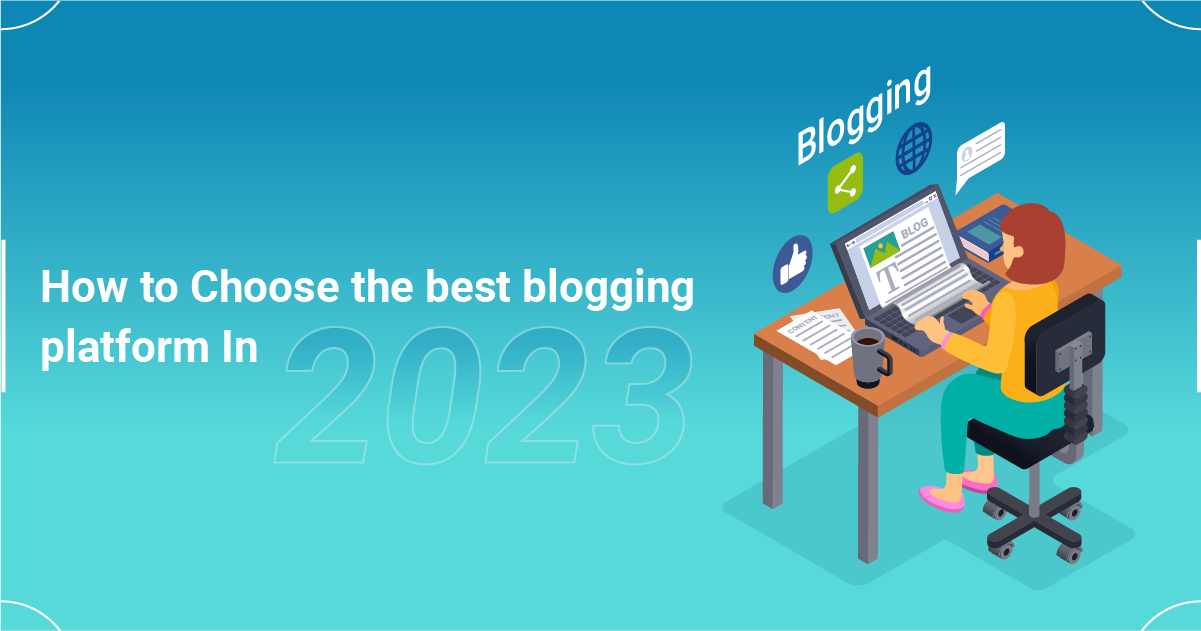
Blogging has emerged as a powerful tool for freelancers, and agencies to share their stories, ideas, and experiences with a global audience. With the internet boom, blogging has become a vital part of modern communication.
Whether you’re looking to start a personal blog, promote a business, or build a community, understanding different platforms, features, capabilities, and limitations are essential to making an informed decision.
As the number of blogging platforms available continues to grow, it can be challenging to determine which one is the most suitable for your needs.
In this blog post, we will explore some of the most critical factors to consider when choosing the best blogging platform in 2023.
1. Purpose Of The Blog
The purpose of a blog can be categorized into two types: Personal and Professional. When choosing a blogging platform, it’s vital to establish your goal for starting a blog. For example, if you want to make money from blogging, choose an ad-free open-source platform that allows you to monetize your content through paid advertising options such as Google AdSense.
On the other hand, if you want to write about personal events and issues in your life, then you should use a free blog platform because it provides an accessible way for readers to leave comments on your posts without having to pay anything or register on the website itself.
Also, consider the type of content you will be sharing and the audience you are trying to reach. Different platforms may have additional features and capabilities that are more suitable for specific blogs.
2. Customization And Control
Another important consideration when choosing a blogging platform is customization and control over the design of your site, including its layout, design elements, and color scheme, as well as how much control you will have over what content goes on your site and how frequently it will be updated.
It’s also crucial that you choose one that offers extensive customization options so that you can tweak things like fonts, font size, and even spacing between paragraphs if necessary so that you can make sure that your site looks exactly how you want it to. The more control you have over the design of your blog, the more likely it is that you will be able to create a site that is both visually appealing and easy for visitors to navigate around.
3. Ease Of Use
In today’s world, it’s hard to find a website that doesn’t have an intuitive interface. A good blogging platform should be easy to use, even for someone who isn’t tech-savvy.
You don’t need to constantly look up documentation or spend hours researching how to use the platform. The more intuitive the platform is, the better it will be for your readers.
4. Cost
If you are starting out in your blogging journey, then cost should not be an issue for you at all because there are many free platforms available on the internet that will give you enough resources to start your blog with no money spent on buying premium features or services from providers. However, as your blog grows, so will the cost of using some of these services; hence, it is always best to compare prices before purchasing a service or product from any provider because sometimes the price may be higher than expected.
5. Scalability
Scale is a factor that can make or break your site. The most popular platforms are built in such a way that they can be scaled across multiple environments, but you should always consider the hardware and software you will need to run your site.
6. SEO & Analytics
Search Engine Optimization (SEO) is important when choosing a blogging platform in 2023. You want to ensure that your site is well-optimized for search engines so that it will not only appear on the first page of Google search results but also appear higher up in the ranking for specific keywords. It is also essential to track your analytics to see how many people visit your site and what they do once they get there to improve your blog’s performance.
Best Blogging Platforms in 2023
1. WordPress
WordPress is the most popular blogging platform in the world. It is free, open-source software that runs on any operating system. Matt Mullenweg and Mike Little created WordPress in 2003.
WordPress has various features that make it easy for you to create your own blog. You can customize your site according to your needs using themes and plugins. You can also add content from other websites using the WordPress plugin API or Shortcodes.
Pros:
- Wide range of customization options and plugins.
- Extensive community and support resources.
- Suitable for both beginners and advanced users.
- Can be used for creating a variety of websites, not only just blogs
Cons:
- For beginners, it can be challenging to navigate.
- Requires hosting and domain name.
- Security can be an issue if not properly maintained.
2. Wix
Wix is another simple and easy-to-use website builder. It can help you create an attractive and professional-looking blog in just a few minutes. Wix has a fantastic drag-and-drop functionality that allows you to add images, text, and other multimedia content easily.
It has a spotless user interface that makes it easy for people with no prior experience in building websites to use it. All you need is a little patience, as it requires some time to learn the basics of this program.
If you want your blog to look like a real one, then Wix is one of the best blogging platforms for you!
Pros:
- User-friendly UI.
- Drag-and-drop design options.
- Wide range of templates and customization options.
Cons:
- Limited scalability.
- Limited flexibility for advanced users.
- Some features require a paid plan.
3. Squarespace
Squarespace is a website builder that allows you to create one-of-a-kind websites, blogs, and landing pages. With the help of its drag-and-drop editor, you can create beautiful websites without any coding skills.
The platform has great features such as pre-built layouts, customizable templates, and Design Tools. This allows you to sell your products online using the platform’s storefront.
Another great feature of Squarespace is its responsive design which means it can be used on all devices, including tablets and smartphones. This feature makes it easy for users to access your site from any device they have at hand.
Pros:
- Sleek and modern design.
- Wide range of customization options.
- Built-in SEO and analytics tools.
- Good for e-commerce.
Cons:
- More expensive than some other platforms.
- Limited flexibility for advanced users.
- Limited scalability.
Ultimately, it’s hard to say which blogging platforms will be the best in five years. There are plenty of other contenders out there, and this list may not cover everything we need to consider.
However, these are some of the most popular platforms and do more than enough to fit the bill; as long as you have a robust and compelling idea to bring to the table and a way to attract attention, you should be able to set up a successful blog on almost any of these platforms. If you’re feeling overwhelmed by the options, which is certainly not uncommon when starting a new project, we hope we’ve clarified things a bit here today. Good luck with your blog!
